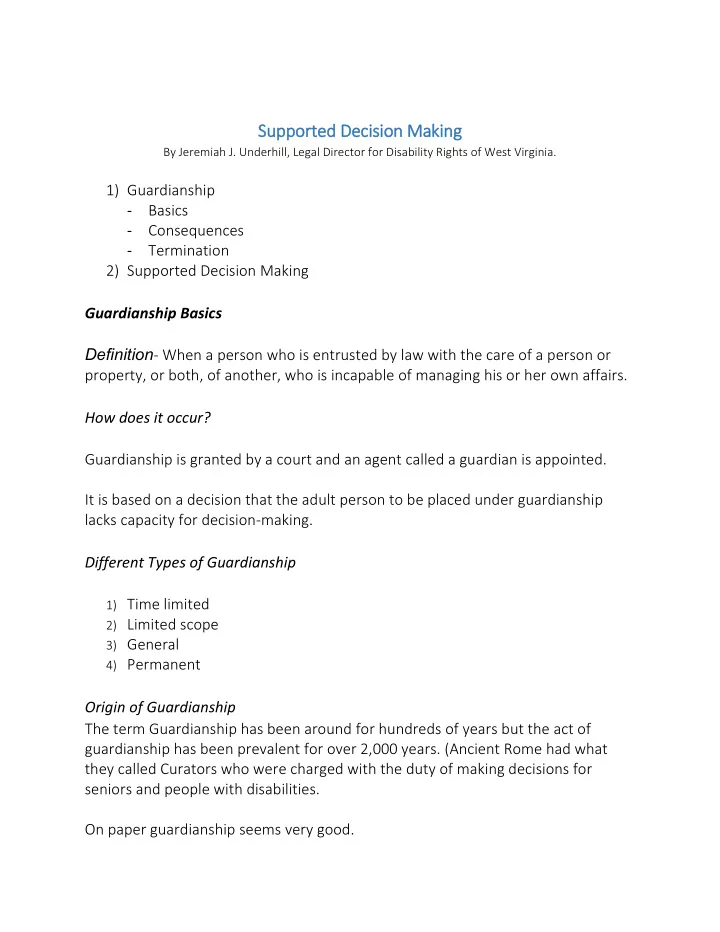

Supported Decision Making By Jeremiah J. Underhill, Legal Director for Disability Rights of West Virginia. 1) Guardianship - Basics - Consequences - Termination 2) Supported Decision Making Guardianship Basics Definition - When a person who is entrusted by law with the care of a person or property, or both, of another, who is incapable of managing his or her own affairs. How does it occur? Guardianship is granted by a court and an agent called a guardian is appointed. It is based on a decision that the adult person to be placed under guardianship lacks capacity for decision-making. Different Types of Guardianship 1) Time limited 2) Limited scope 3) General 4) Permanent Origin of Guardianship The term Guardianship has been around for hundreds of years but the act of guardianship has been prevalent for over 2,000 years. (Ancient Rome had what they called Curators who were charged with the duty of making decisions for seniors and people with disabilities. On paper guardianship seems very good.
But in practice we see a lot of problems with the guardianship. - Financial exploitation - Abusive relationships - Absent guardians - Person loses all sense of self-worth and wellbeing This loss of control reduces a person’s overall health. - Reduction in physical and mental health - Reduction in life expectancy - Reduction in overall happiness - Just about part of the person’s life is impacted negatively when they are placed under a full and permanent guardianship. The ease of getting a guardianship order in place. While clear and convincing evidence is needed in most instances to establish a guardianship we routinely see courts award guardianship because: 1) A doctor misdiagnosing a medical condition as a mental condition. 2) A doctor describing a temporary condition as a permanent one. 3) A statement from a person with a conflict of interest. 4) A person who is trying to supplant the decision making authority of a parent, child or sibling because they are tired arguing about decisions Supported Decision Making (SDM) Focuses on promoting ways that people with cognitive disabilities can make their own decisions about their own lives, rather than being placed under a guardianship in which a surrogate makes life decisions on their behalf. SDM is a ranging spectrum of informal support from individuals who speak, rather than for, a person with a disability to accomplish decision making. SDM Core Principles 1) A person’s right to choose is presumed
2) A person should have control of decisions that impact their life aided by natural support services and networks. 3) Decision making assistance is available when needed 4) Assistance in decision making comes in a variety of forms. What is good SDM support? 1) Helping the person to focus on the decision making? 2) Helping the person weigh the pros and cons of a decision. 3) Helping the person to understand their options when making a decision. 4) Helping a person to base their decisions on their own preferences and expressed desires. 5) Assisting the person in understanding their choices and any relevant information. What is not good SDM support? 1) Only providing information that supports the decision you think is right 2) Not exploring all options. 3) Posing the wrong question. SDM can be informal or formal Informal – A process where one or people work with the person only when needed to provide assistance and develop a plan, if necessary, in making a decision. a. Could be one-on-one b. Could be a group discussion c. Could be a team approach where each team member helps the person with certain areas of their life. Formal – a formal agreement is created between the person and someone else. Tools of formal SDM 1) Power of Attorney 2) Representative Payee 3) Trusts
4) Healthcare Surrogate Good SDM Policy 1) SDM should be considered before guardianship, 2) We should always be striving to be maximizing the person’s participation in the decision making process. 3) We need to provide every person the opportunity to exercise rights. 4) If the person already has a guardian then part of that guardianship should be SDM if the guardianship is necessary. Goals of SDM 1) Consider alternatives to guardianship. 2) Think about ways to assistant and someone in the decision making process instead making decision for them. 3) Put as much control as possible in to the hands of the person with the disability. Final Note SDM occurs when, with support, the person is the ultimate decision maker. Everyone needs help in making decisions. Some people may need more help than others but everyone has the same rights.
Recommend
More recommend